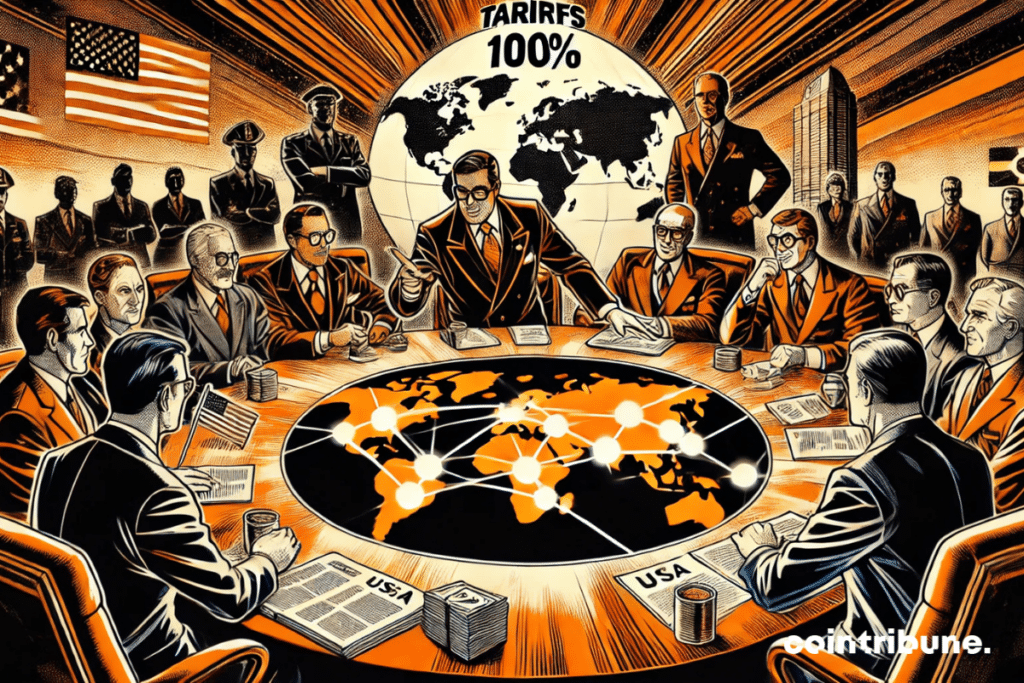Trump Fights Back : 100 % Tariffs On BRICS Exports Proposed
The economic tensions between major powers are reaching a new level. U.S. President Donald Trump has issued a direct threat to the member countries of the BRICS alliance, which are trying to reduce their dependence on the U.S. dollar. In response to these dedollarization initiatives, he announced a 100 % tariff on their exports to the United States. This stance, accompanied by the creation of a new agency tasked with collecting these customs duties, reflects a clear intention to defend the supremacy of the dollar and to counter any challenge to American economic hegemony. As the BRICS explore alternative payment systems, this declaration could redefine the balance of power on the global geopolitical and commercial stage.

An unprecedented threat to deter dedollarization
Donald Trump has spoken firmly against the BRICS initiatives aimed at reducing their dependence on the U.S. dollar. In a decidedly aggressive tone, he stated that “as a nation of the BRICS, they will face a 100 % tariff if they only think about pursuing dedollarization.” This statement fits within a context where powers like China and Russia are seeking to establish an exchange system based on their local currencies, thereby threatening the hegemony of the greenback in global trade.
In response to this offensive, Trump announced the establishment of the External Revenue Service (ERS), an agency dedicated to collecting taxes and customs duties on imports. This mechanism aims to strengthen a policy of economic protectionism through heavy penalties for nations that seek to contest dollar supremacy. The implementation of these measures could transform global trade balances by imposing colossal costs on the emerging economies of the BRICS with a view to redefining economic power relations.
This strategy, centered on defending the dollar, reflects a clear intention to consolidate its central role in international transactions. However, such an approach risks provoking repercussions far beyond financial markets. These measures could intensify political and economic tensions, engender increased rivalries, and undermine traditional trade partnerships.
The BRICS face a major economic and political challenge
Trump’s threats have not yet provoked a visible retreat from the BRICS. This group, which brings together several major emerging economies, is actively pursuing its project to establish alternatives to the dollar-dominated monetary system. Among these initiatives is the creation of a new international payment system intended to bolster their economic independence. This approach reflects a strong desire to reduce U.S. influence over global trade exchanges. However, the imposition of 100 % tariffs on their exports to the United States could seriously affect their foreign trade and hinder their growth.
The economic repercussions would not solely concern the BRICS. If tensions were to escalate, it could lead to significant disruptions in global supply chains, thus increasing costs for businesses and consumers. Moreover, this protectionist policy could paradoxically consolidate the dollar’s position by reducing the appeal and effectiveness of alternative monetary initiatives put forward by the bloc.
In a world already weakened by economic uncertainties, such measures are likely to exacerbate the fragmentation of international trade relations. This dynamic would encourage some countries to diversify their economic alliances and prioritize bilateral or regional partnerships. If this trend were to continue, the coming years could be marked by an escalation of economic rivalries, transforming the current monetary struggle into a full-scale commercial conflict.
The confrontation between the United States and the BRICS embodies a broader struggle to define the rules that will structure the global economy. If Trump’s tariff threats materialize, they could disrupt the current balances and accelerate the emergence of a multipolar system, where American influence would be contested. However, these measures could also worsen inequalities between nations and establish new barriers to international trade. In this uncertain environment, the attitude of the BRICS and the strategic choices of the United States will play a key role in shaping the future of global economic relations.
Maximize your Cointribune experience with our "Read to Earn" program! For every article you read, earn points and access exclusive rewards. Sign up now and start earning benefits.
Diplômé de Sciences Po Toulouse et titulaire d'une certification consultant blockchain délivrée par Alyra, j'ai rejoint l'aventure Cointribune en 2019. Convaincu du potentiel de la blockchain pour transformer de nombreux secteurs de l'économie, j'ai pris l'engagement de sensibiliser et d'informer le grand public sur cet écosystème en constante évolution. Mon objectif est de permettre à chacun de mieux comprendre la blockchain et de saisir les opportunités qu'elle offre. Je m'efforce chaque jour de fournir une analyse objective de l'actualité, de décrypter les tendances du marché, de relayer les dernières innovations technologiques et de mettre en perspective les enjeux économiques et sociétaux de cette révolution en marche.
The views, thoughts, and opinions expressed in this article belong solely to the author, and should not be taken as investment advice. Do your own research before taking any investment decisions.